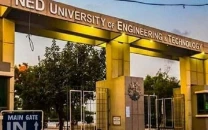What does US-India tech coupling mean for Pakistan?
Pakistan’s digital transformation is in its nascent stage, and vulnerable to a problematic political-economic matrix

Perhaps the most significant facet to the US-India partnership is the growing technological coupling, parallel to US-China tech decoupling. This intensification and shift of tech policies from China to India is evident and exemplary of the geopolitical rivalries. While initiatives like the Initiative on Critical and Emerging Technology (iCET) and the Trade and Technology Council (TTC) are no doubt great achievements by India, it comes with certain implications for Pakistan, even if Pakistan is not the primary target in this tech coupling between the US and India.
Pakistan’s digital transformation is in its nascent stage, and vulnerable to a problematic political-economic matrix. Added to these troubles is the resurgence of violent extremism, dragging the country back into a state of security paralysis. Unfortunately, the frozen Indo-Pak ties do not help Pakistan either. India’s evolution and revolution as a technologically advanced state becomes a natural factor of unbalancing strategic stability in South Asia. The iCET between the US and India is the lynchpin upon which India could become the next technological might, perhaps even an extension of the Silicon Valley. Access and advancement of critical infrastructure technologies will allow India to have further leverage and influence in regional and global politics.
This growing technology cooperation between the Western countries and India creates multi-level implications for Pakistan even if its sole target is China. Some are briefly identified here:
Increased competition and access to technology: Already a staggering economy, Pakistan will face an increased competition in the global arena of tech sector, particularly in areas of software development and IT services. India’s growing tech partnerships with the US may provide it with greater access to cutting-edge technology, which could give it a competitive advantage over Pakistan in certain areas. For example, the intensified information sharing will allow the US and India to collaborate on critical infrastructure technology which, for Pakistan, can be concerning. It may also lead to the development of new vulnerabilities that could be exploited by cybercriminals or sponsored hacking groups. This could result in cyberattacks against Pakistan’s government, businesses and citizens: the Pegasus episode is still a fresh memory.
Moreover, the US-India cooperation will result in a more strategic competition in South Asia due to the advancement of military technology, including cyber-weaponry. This could result in the development of more sophisticated and advanced cyber-weapons, enhancing the asymmetry between Pakistan and India. As Noor Ul Ain writes for South Asian Voices, “The India-Pakistan rivalry is not restricted or solely aggravated by the U.S.-China strategic rivalry. However, competition between the United States and China has resulted in an accelerated piling of weapons, enabling India and Pakistan’s capabilities against each other.”
Not only has that but India intended to shift the technology supply chain value and mechanisms towards itself. The semiconductor industry is part of the larger technology rivalry taking place between the US and China. This partnership aims to build and innovate within this industry to perhaps even stop reliance on Taiwan entirely. The US and Indian semiconductor counterparts will be setting up a taskforce not only dedicated for this but also for emerging telecommunications and space technology. Naturally these advancements will unfortunately make Pakistan’s existing capabilities from a security and economic outlook quite redundant.
Therefore, Pakistan must stay vigilant on this front and take proactive measures to — if not entirely insulate itself from these implications — at least be prepared to deal with them. In such a scenario, Pakistan must not only rely on competing powers like the US and China to sustain itself in the tech-driven world, but capture the opportunity through technology to revitalise its economy, governance and people.
Published in The Express Tribune, February 25th, 2023.
Like Opinion & Editorial on Facebook, follow @ETOpEd on Twitter to receive all updates on all our daily pieces.














COMMENTS
Comments are moderated and generally will be posted if they are on-topic and not abusive.
For more information, please see our Comments FAQ